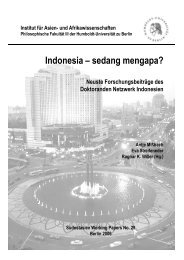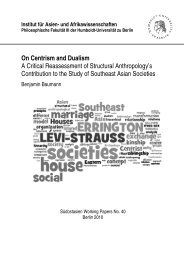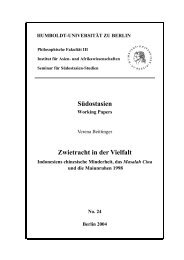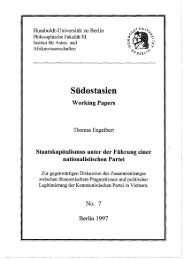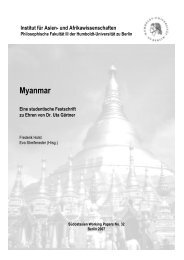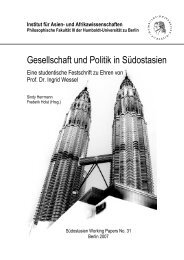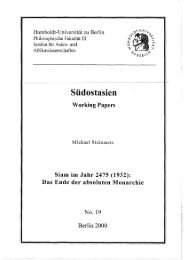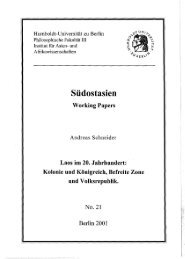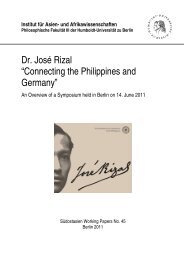Quo Vadis, Indonesien - HU Berlin
Quo Vadis, Indonesien - HU Berlin
Quo Vadis, Indonesien - HU Berlin
Sie wollen auch ein ePaper? Erhöhen Sie die Reichweite Ihrer Titel.
YUMPU macht aus Druck-PDFs automatisch weboptimierte ePaper, die Google liebt.
ism created a transnational network for trade, credit and information superior to any nativeentrepreneurship. They were further advantaged by Suharto’s early preference for working with theChinese middle class since the minority lacked full political rights and was therefore unlikely toprotest his economic exploitation. 46 Ultraconservatives claimed these historic imbalances to be the“conscious product of a sinister plot by domestic and international forces to Christianize Indonesia”. 47Habibie and ICMI employed such populist demand for proportionalism and thus cemented this discourse.48 Already in 1992, the government removed Christian ministers who had long controlled theeconomic ministries and replaced them with Muslims with ICMI connections. The numbers of influentialChristians in the higher echelons of the intelligence services and the armed forces declinedsignificantly. 49Out of an alliance of Suharto supporters with conservative Muslim groups emerged an anti-Chineseand a strong anti-Christian discourse that blamed Indonesian minorities for unfavourable economicand political conditions. However, as Robert Hefner argues, its real target was the reform-orientednationalist-Muslim alliance. Wahid held progressive and moderate views and was an outspoken opponentof Islamic fundamentalism and the idea of an Islamic state. He had distinguished himself as anardent spokesman for religious minorities and a pluralist society. 50 Megawati enjoyed the support ofsecular and nationalist elites as well as from Christian businessmen and politicians. Government-sponsoredslander emerged against Wahid in highly religious terms: he was portrayed as an infidel who didnot pray, did not fast, and supported “Christianization”. 51 Already in October 1996, fierce anti-Christianand anti-Chinese riots swept through Eastern Java.A decisive factor in the construction of an extremely hostile anti-Christian discourse was Suharto’sson-in-law, General Prabowo Subianto. He had allied the two ultraconservative groups ‘IndonesianCouncil for Islamic Propagation’ (DDII) and ‘Indonesian Committee for the Solidarity of the MuslimWorld’ (KISDI) to the regime’s agenda. 52 Through his hand, the regime spread anti-Zionist and anti-Christian sentiments. The KISDI raised open concern among Muslims for its public statements againstJews, Christians, Chinese and the United States, because they were strikingly out of character with theIndonesian Muslim mainstream. 53 In 1998, during the ongoing economic crisis, Prabowo produced asmall booklet concerning the nature of Indonesia’s economic crisis and the country’s ongoing negotiationswith the International Monetary Fund (IMF). Entitled “A Conspiracy to overthrow Suharto”, thebooklet outlined a domestic and international conspiracy against Suharto that consisted of the IMF, theUnited States, Israel, Indonesian-Chinese, and the pro-democracy movement, united under the label ofthe “Jewish-Jesuit-American-Chinese”. 54 Suharto, the booklet explained, had been targeted because ofhis Muslim faith, and because he had become too powerful to the anonymous conglomerate of Jews,Jesuits, Chinese, and CIA-Mossad agents that controlled international capitalism. 55 The book was distributedfirst and foremost among ultraconservative Muslim circles at a time when pro-democracy46Van Bruinessen, Islamic State or State Islam? Observers estimated that by the 1990s, Sino-Indonesians controlled about65% of Indonesia’s nonfarm private enterprise.47Hefner, Civil Islam, 140.48Hefner, Civil Islam.49Bruinessen, Islamic State or State Islam?, 1.50Hefner, Civil Islam, xiv. See also Noorhaidi Hasan (2002), Faith and Politics: The Rise of the Laskar Jihad in the Era ofTransition in Indonesia. In: Indonesia 73, 163.51Hefner, Civil Islam, 188.52Noorhaidi Hasan, The radical Muslim discourse on Jihad and the Hatred of Christians, paper presented at the “InternationalSymposium on Christianity in Indonesia, Perspectives of Power”, held in the University of Frankfurt, Germany, from12 to 14 December 2003, 4.53Hefner, Civil Islam, 202; Hasan, The radical Muslim discourse, 4.54Hefner, Civil Islam, 202; Hasan, The radical Muslim discourse, 4.55Cited in Hefner, Civil Islam, 203.21



